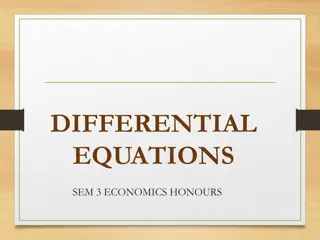Understanding Differential Equations in Economics Honours
Differential equations, introduced by Newton and Leibniz in the 17th century, play a key role in economics. These equations involve derivatives and represent implicit functional relationships between variables and their differentials, often related to time functions. The order and degree of a differ
1 views • 16 slides
Philosophical Reflections on Knowledge and Reality
The content delves into philosophical musings from renowned thinkers like Descartes, Leibniz, and Spinoza, exploring concepts such as innate ideas, geometrical truths, and the nature of philosophy itself. Through their writings, we reflect on the origins of knowledge, the interplay of sensory experi
1 views • 22 slides
Isaac Newton: Contributions to Mathematics and Physics
Isaac Newton, a renowned physicist and mathematician from England, was the greatest scientist of his era. Despite being described as 'idle' and 'inattentive' in school, he formulated the Three Laws of Motion and the law of Universal Gravitation. Newton's mathematical contributions include studying p
0 views • 16 slides
Exploring Academic Lineage: Meir Feder's Mathematical Family Tree
Delve into the intricate academic genealogy of Meir Feder, tracing his lineage through the Math Genealogy Project and uncovering a rich tapestry connecting various scholars. From the creation of Lab 102(4) to the profound influence of historical figures like Newton and Leibniz, this journey through
0 views • 11 slides
Exploring Math History and Problem-Solving Techniques
Delve into the historical roots of mathematics with discussions on Archimedes' and Leibniz's approximations, culminating in John Wallis' symbolic contributions. Follow the problem-solving steps outlined by George Pólya and learn to apply the Accumulator Pattern to mathematical challenges. Discover
0 views • 26 slides




